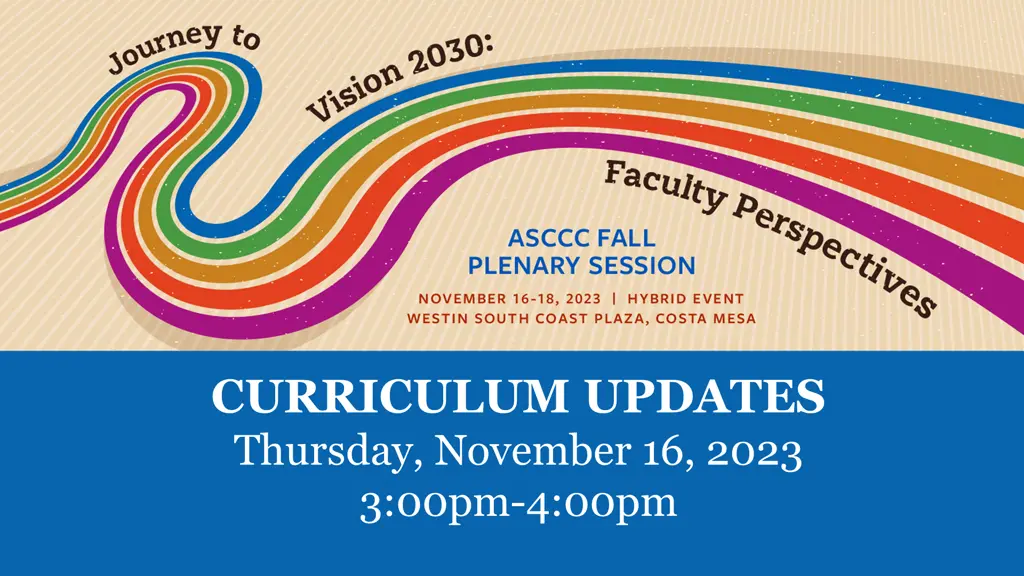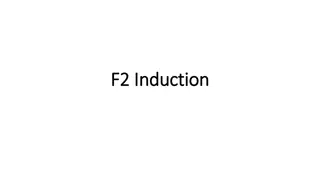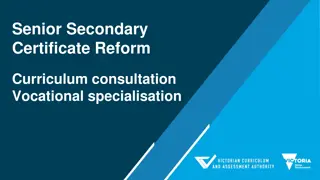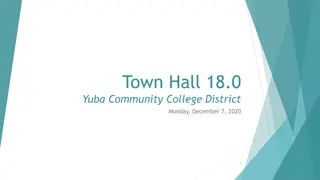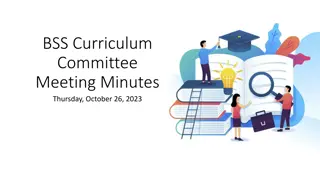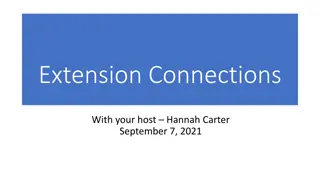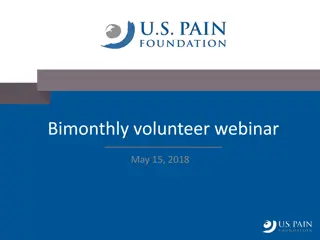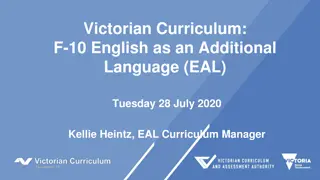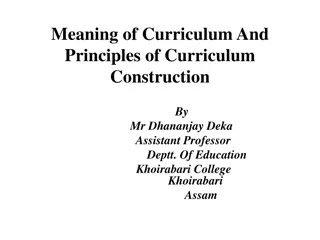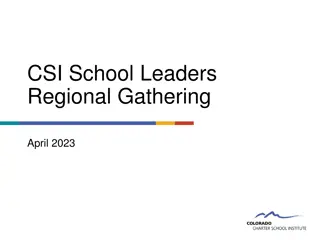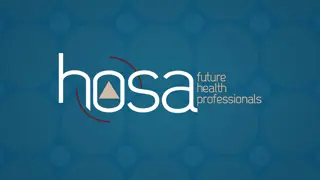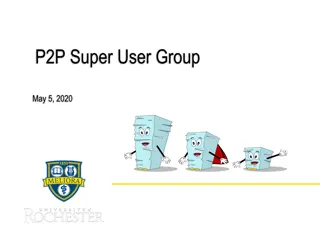Curriculum Updates
Stay up to date on statewide curricular updates that promote inclusion, diversity, equity, antiracism, and accessibility for students.
Download Presentation

Please find below an Image/Link to download the presentation.
The content on the website is provided AS IS for your information and personal use only. It may not be sold, licensed, or shared on other websites without obtaining consent from the author.If you encounter any issues during the download, it is possible that the publisher has removed the file from their server.
You are allowed to download the files provided on this website for personal or commercial use, subject to the condition that they are used lawfully. All files are the property of their respective owners.
The content on the website is provided AS IS for your information and personal use only. It may not be sold, licensed, or shared on other websites without obtaining consent from the author.
E N D
Presentation Transcript
CURRICULUM UPDATES Thursday, November 16, 2023 3:00pm-4:00pm
PRESENTERS Iolani Sodhy-Gereben, College of Alameda (ASCCC Curriculum Committee) Robert L. Stewart Jr, ASCCC Treasurer 2
SESSION DESCRIPTION At the heart of the California Community Colleges and any institution of higher learning is its curriculum. According to Title 5 Section 53200(c), academic senates are given primacy in making recommendations on policy development and implementation on: curriculum, including establishment of prerequisites and placing courses within disciplines; degree and certificate requirements; grading policies; educational program development; and standards or policies regarding student preparation and success. Therefore, it is imperative that faculty stay up to date on statewide changes that impact curriculum, pedagogy, and the success of our students. Please join us in this fully online breakout session where we will dialog on the latest statewide curricular updates that aim to increase inclusion, diversity, equity, antiracism and accessibility for our students. 3
Session Agenda I. II. Work Experience Updates III. Associates Degree Updates IV. Ethnic Studies Updates V. Baccalaureate Degree Program Updates VI. Draft Title 5 Update: DEIA in COR VII.Equitable Placement Upcoming Deadlines VIII.Resources IX. Questions Title 5 Updates - The Process 4
Title 5- The Process What is Title 5? Title 5 is the Education section of the California Code of Regulations (CCR) The California Code of Regulations is the official publication of regulations that are adopted, amended or repealed by state agencies. CCR contains 27 Titles The regulations are passed by the Board of Governors, reviewed by Dept. of Finance, and filed with the Secretary of State. They have the force of the law. Title 5 supports the California Education Code (Ed Code), a collection of California laws that regulate education in the state. 6
How Is Title 5 Updated in the California Community College System? Example: DEI in the COR Regulations Initiation of Title 5 Updates New or amended legislation (State or Federal) Resolutions process (Ex. ASCCC if within senate purview i.e. Curriculum) Need identified by Chancellor s Office Curriculum-Specific Title 5 Updates Example:ASCCC Resolution F21 09.01 Adding Culturally Responsive Curriculum, Equity Mindedness and Anti-Racism to Course Outline of Record (COR) Requirements in Title 5 (Referred to 5C): revise California Code of Regulations Title 5 including section 55002 titled Standards and Criteria for Courses to include a component of culturally responsive curriculum, equity mindedness and anti-racism integrated into the COR that allows for local control on how that requirement is fulfilled 7
How Is Title 5 Updated in the California Community College System? Example: DEI in the COR Regulations 2 California Community Colleges Curriculum Committee (5C) - Workgroup on DEIAA in COR California Community Colleges Board of Governors - Agendize proposed regulatory action. 1stand 2ndreads. Public Comment Periods (45 day and 15 day) (timed with Board of Governors meetings) Chaptering by the Secretary of State (after certification by Department of Finance) CCCCO Guidance Memo (typically 180 days to implement) 8
Title 5 Regulations- Work Experience This Photo by Unknown author is licensed under CC BY. 9
Work Experience Regulation Update Timeline Revised Title 5 Work Experience Regulations Approved by BOG July 2022. Chaptered in July 2023 and official on August 26, 2023 Districts have until February 22, 2024 to update policies and procedures. Colleges should be reviewing and updating work experience curriculum. Text of Updated Regulations CCCCO Guidance 10
Revisions General Simplify regulations to allow local districts to increase work experience opportunities for students and expand beyond a strict focus on CTE programs. Existing regulations include onerous and archaic requirements that stifle innovation and expansion of work experience Rename from Cooperative Work Experience to Work Experience Education Removes requirement for "Local Plan" and replaces with requirement for local board policy and procedures. Collapses 14 existing separate sections into more intentionally organized and sequenced 5 sections in Article 4 55250 55254. Allows for virtual work experience opportunities. Specifically permits noncredit work experience education and calls for disaggregated data on enrollment and student success inclusive of these courses Removes distinction between "Occupational" and "General" work experience Revises and simplifies credit hour calculation for work experience 11
Updated Regulations: Units/Hours Previous Regulation: Updated Regulation: 1. 55256.5 (c): The following formula will be used to determine the number of units to be awarded: 1. 55253 (a): (a)Units of credit for work experience education shall be calculated as follows: 2. work experience education offered as a credit course: one semester unit of credit will be awarded for every 54 hours of work experience, or one quarter unit for every 33 hours of work experience, or the equivalent locally determined minimum threshold for awarding one unit of credit as codified in local board policy or procedure. Units of credit may be awarded in increments of .5 units; and 2. Each 75 hours of paid work equals one semester credit or 50 hours equals one quarter credit. 3. Each 60 hours of non-paid work equals one semester credit or 40 hours equals one quarter credit. 4. Units may be awarded in 0.5 unit increments. 3. work experience education integrated as a component of a course: units of credit will follow standards for credit hour calculations in section 55002.5 for all activity, lab, or other instructional course components. Units of credit for the work experience component shall be calculated according to the formula in subparagraph (1). 12
Updated Regulations: Total Units Previous Regulation: Updated Regulation: 1. 55253(a): For the satisfactory completion of all types of Cooperative Work Experience Education, students may earn up to a total of 16 semester credit hours or 24 quarter credit hours, subject to the following limitations: 1. 55253(c): A maximum of fourteen semester credit hours or twenty-one quarter credit hours may be earned during one enrollment period in work experience education. Students may repeat a work experience education course subject to section 55040. 2. General Work Experience Education. 3. A maximum of six semester credit hours or nine quarter credit hours may be earned during one enrollment period in general work experience education. 2. Confusion about course repeatability 4. Occupational Work Experience Education. 5. A maximum of eight credit hours may be earned during one enrollment period in occupational work experience education. 13
Updated Regulations: General/Occupational Previous Regulation: Updated Regulation: 1. 55252: Cooperative Work Experience Education is a district-initiated and district- controlled program of education consisting of the following types: 1. This distinction is removed all work experience education follows the same requirements. 2. 55250(a) defines the purpose of work experience in part as: The purpose of work experience education is to provide students with an integrated instructional program that provides opportunities to connect academic curricula to applied experiential learning in the workplace. Work experience education should be substantive in nature, linked in a way relevant to a student s educational pathway, and contribute to demonstrable learning outcomes that have value towards a degree or certificate. 2. (a) General Work Experience Education is supervised employment which is intended to assist students in acquiring desirable work habits, attitudes and career awareness. The work experience need not be related to the students' educational goals. 3. (b) Occupational Work Experience Education is supervised employment extending classroom based occupational learning at an on-the-job learning station relating to the students' educational or occupational goal. 14
Updated Regulations: Noncredit Updated Regulation: 1. 55250(b) defines work experience and explicitly allows noncredit instruction and instruction as part of a course: 2. Work experience education within the California Community Colleges involves student employment and/or internships selected, approved, and supervised by districts to provide meaningful work experiences related to the course of study, or specific career pathway training, combined with instruction in critical workplace skills. Work experience education may include paid or unpaid employment, full or part-time employment, and may be structured as separate credit or noncredit classes, or integrated as a component of a course. It should be integrated as part of a student s educational pathway allowing students to achieve both educational and occupational goals. It should also assist the student in developing career awareness, learning industry culture, competencies and norms, and developing professional networks in their desired field to support career mobility. Work experience education should provide economically disadvantaged students with opportunities to earn a wage while completing program requirements and earning academic credit. Previous Regulation: 1. Did not explicitly include noncredit instruction 15
Associates Degree: 55060-55062 Curriculum Highlights include: Removing the requirement of Elementary Algebra as a prerequisite for a course to be approved to meet the mathematics requirement; Aligning associates degree GE course requirements with the CalGETC pattern; Final Revision to Title 5 (annoucement 11/9/23) Becomes effective 11/16/23 College have 180 days to update their GE pattern: deadline May 15, 2024 17
Associates Degree: 55060-55062 2 Other Highlights include: Clarifying definitions of course "completion" (student receives credit) and course "satisfactory completion" (student receives a "C" or better or a "P";); Allowing (not requiring) districts to calculate Grade Point Average (GPA) solely on courses that satisfy degree requirements when a student earns over 60 units (for local degrees); Clarifying that a course may be used by a student to meet a general education area requirement, a major/area of emphasis requirement, and a competency demonstration; Adding language from Section 55064 regarding the use of noncredit courses to fulfill credit requirements as a form of credit for prior learning; 18
New Local GE Pattern Minimum of 21 semester units (28-31.5 quarter units) of GE in the following areas: English Composition Oral Communication and Critical Thinking Mathematical Concepts and Quantitative Reasoning Arts and Humanities Social and Behavioral Sciences Natural Sciences Ethnic Studies 19
Associates Degree: 55060-55062 3 Clarifying that students who have been awarded a bachelor's degree from an 'institutionally-accredited institution' (new U.S. Department of Education nomenclature) shall be deemed to have fulfilled the general education course requirements for the associate degree; and Specifying that students who intend to transfer shall be advised of limitations transfer institutions may place on the transferability of credits, based on institutional accreditation, course modality, and any other relevant factors. 20
Title 5 Regulations- Ethnic Studies This Photo by Unknown author is licensed under CC BY-SA-NC. 21
Ethnic Studies Graduation Requirement First implemented as a required competency: See CCCCO Guidance Memo ESS 22-300-008 June 15, 2022 Fall 2024 - CCC ethnic studies course is now an Associate in Arts and Associate in Science degree graduation requirement CCC Ethnic Studies Competencies approved April 2023 With chaptering of Title 5 revisions to Associate Degree requirements (October 2023), Ethnic Studies is a distinct general education area requirement Ethnic Studies discipline updated in Minimum Qualifications for Faculty and Administrators in California Community Colleges. 22
Baccalaureate Degree Program Updates 2 Equitable baccalaureate attainment is the first Strategic Direction in Vision 2030, within which the community college baccalaureate degree program (BDP) plays a necessary role. The Chancellor s Office continues to support the expansion of community college baccalaureate degree programs: To date the Chancellor s Office has approved over 30 community college baccalaureate degrees, inclusive of the 15 original pilot programs, the 9 programs approved from cycle 1, and the now 9 programs approved from cycle 2. Two additional programs from cycle 2 are approved. Congratulations to Los Angeles Mission College on the approval of their Biomanufacturing program and to San Diego Miramar College on the approval of their Public Safety Management program. Cycle 3 applications were recently reviewed with 12 programs moving forward into intersegmental review. Cycle 4 applications will soon be released and will be due January 15, 2024. 24
Baccalaureate Degree Program Updates 3 Dental Hygiene Dental Hygiene Administration Respiratory Care Occupational Studies/Occupational Therapy Assistant Histotechnology Research Laboratory Technology Equine and Ranch Management The Chancellor s Office has established a process with CSU for the expedited review of programs which have been previously approved (i.e., CSU will quickly confirm the curriculum is the same and a full program duplication analysis will not be needed). Those programs include: Airframe Manufacturing Technology Automotive Career Education Automotive Technology Industrial Automation Mortuary Science 25
Baccalaureate Degree Program Updates 4 The Chancellor s Office continues to work with CSU and ICAS (Intersegmental Committee of the Academic Senates) to establish a clear definition, standard, and criteria for program duplication. Those agreements will be detailed in a shared intersegmental guide that will simplify and streamline this process moving forward. 26
Draft Title 5 Regulations- DEIA in COR This Photo by Unknown author is licensed under CC BY-NC-ND. 27
Draft Title 5 Regulations: DEIAA in Course Outline of Record ASCCC Resolution 09.01 (Fall 2021) called for ASCCC to work with Chancellor's Office to revise Title 5 "to include a component of culturally responsive curriculum, equity mindedness, and anti- racism integrated into the COR that allows for local control on how that requirement is fulfilled" Draft regulations developed by 5C Proposed new CCR title 5 55001 Curriculum Committee, including (c) The curriculum committee shall be trained in principles of diversity, equity, inclusion, anti-racism, and accessibility Proposed new CCR title 5 55001.5 Diversity, Equity, Inclusion, Anti-Racism, and Accessibility Diversity, equity, inclusion, anti-racism. The curriculum committee shall have a documented procedure for ensuring that the course outline of record of all courses approved pursuant to section 55002 demonstrates a culturally responsive approach that integrates principles of diversity, equity, inclusion, and anti-racism. Accessibility. The curriculum committee shall have a documented procedure for ensuring that the course outline of record guarantees accessibility for every student, including students with disabilities 28
Equitable Placement UpcomingDeadlines From: AB 1705 Validation of Equitable Placement, Support and Completion Practices for General Education and Non-STEM Programs Chancellor s Office Memo 5/22/23 Follow up to AB 1705 guidance memo (December 2022) and AB 1705 Implementation Guide (March 2023) Link to specific Title 5 language: 55003. Policies for Prerequisites, Corequisites and Advisories on Recommended Preparation.) Colleges recently received individualized letters with feedback to their 7/1/23 certification submission. Colleges must also be in compliance with concurrent support: non-repetition of high school math AND appropriate use of non-credit. College should keep in mind the following date to submit the State Data submission Template form: 7/1/24 30
Resources Pending Regulatory Action- CCCCO Effective November 16, 2023 Work Experience Education Memo California Internship and Work Experience Association (CIWEA) Learning Aligned Assistance Program (LAEP) Academic Senate for California Community Colleges (ASCCC) Work Experience Regulation Changes: Expanded Opportunities for Experiential Learning (Rostrum Article) Procedures and Standing Orders of the Board of Governors, December 2022 Edition Adding Culturally Responsive Curriculum, Equity Mindedness and Anti-Racism to Course Outline of Record (COR) Requirements in Title 5 Effective November 16, 2023 Associate Degree Requirements Memo Effective April 26, 2023 DEIA Evaluation & Tenure Review of District Employees Memo ESS 23-38 Annual Curriculum Approval Certification Memo California Community Colleges Bachelor's Degree Program 31
Thank You! Questions? info@asccc.org 32
